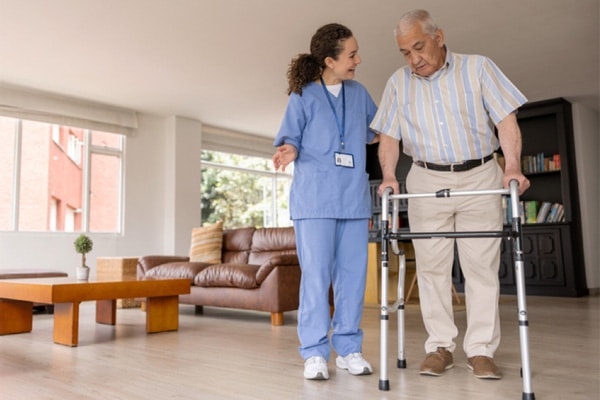If someone you love has been hospitalized for a stroke, there are frequently many questions about the stroke recovery process and the transition back to the home environment. Knowing what to expect in the days, weeks and months following a stroke is important.
At American, Advocate and Whitsyms In-Home Care, we understand that while the prospect of bringing a loved one home following a stroke may be a huge relief, there are many logistical issues that need to be addressed to ensure safety and adherence to a stroke recovery plan.
Day 1
Two of the first steps toward recovery are determining the type of stroke and the severity of the stroke. With this information, the medical team can work together to determine the best course of action to aid in recovery. The team typically consists of physicians, neurologists, and occupational, speech, and physical therapists who work to develop a rehabilitation plan. Therapy often begins while the individual is still in the hospital.
Initial Weeks Following a Stroke
Long-term effects of a stroke will vary from person to person based upon the severity and the part of the brain affected. It’s common for those recovering from a stroke to experience:
- Physical symptoms – weakness, paralysis, difficulty swallowing
- Cognitive symptoms – memory problems and trouble speaking
- Emotional symptoms – depression, anxiety and impulsivity
- Extreme fatigue and trouble sleeping
To aid individuals in their recovery process, the healthcare team will recommend therapy to help patients make strides toward rehabilitation. This may include:
- Physical therapy – helps the stroke patient relearn motor activities such as walking, standing, sitting, lying down.
- Occupational therapy – helps the stroke patient relearn activities such as drinking and swallowing, dressing, bathing, cooking, eating, writing, using the bathroom.
- Speech therapy – helps the stroke patient relearn language and speaking skills.
Therapy sessions are customized to each individual’s goals and needs, and can often be conducted in the home.
Post Stroke: 1 – 3 Months
The initial weeks and months following a stroke are important. The goal of rehabilitation is to restore as much function as possible to pre-stroke levels. While the healthcare team monitors the patient and therapy continues, it’s important to anticipate setbacks during this time. The setbacks can be physically, emotionally and mentally challenging for both the patient and his/her family. Work with the healthcare team to make adjustments as needed to the rehabilitation plan and prioritize mental health.
Post Stroke: 6 Months and Beyond
After six months, continued recovery is possible, but improvements will be slower. Some patients may experience complete recovery and others may have ongoing impairments. During this time, it’s important to remain in contact with your healthcare team:
- Primary care physician. The primary care physician can manage any health concerns beyond the stroke and can recommend lifestyle changes that can help prevent future strokes.
- Neurologist. With a deep understanding of the mechanisms behind stroke-related brain injury, a neurologist can recommend customized treatments to target the affected area of the brain.
- Rehabilitation psychologist. A psychologist will provide support with emotional, cognitive and behavioral functioning.
- Occupational, physical and speech therapists. OT, PT, and ST will aid in the ongoing recovery of functioning in order to complete day-to-day activities.
A coordinated effort between the members of your healthcare team can help bring about further progress and recovery in the months and years following a stroke.
Post Stroke: How Home Care Can Help
To help aid in the recovery process, the referred care providers at American, Advocate and Whitsyms In-Home Care are here to help with a variety of care needs. During the initial hospitalization following a stroke, a knowledgeable referred care provider can help assess the home for fall risks and recommend other safety enhancements that will make for an easier transition home.
Once home, a referred care provider can also assist with:
- Bathing, dressing and personal hygiene
- Planning and preparing nourishing meals and snacks, with adherence to any dietary restrictions
- Light housekeeping and laundry
- Friendly companionship and conversation
- Encouragement to complete physical, occupational or speech therapy exercises / activities
- Transportation to follow-up medical or therapy appointments
- Medication reminders
- Respite for family caregivers to prioritize self-care
- And much more!
For additional information about how a referred Florida senior care expert can help you or someone you love transition home safely following a stroke, contact us today. We have offices throughout Florida and we look forward to helping you.


